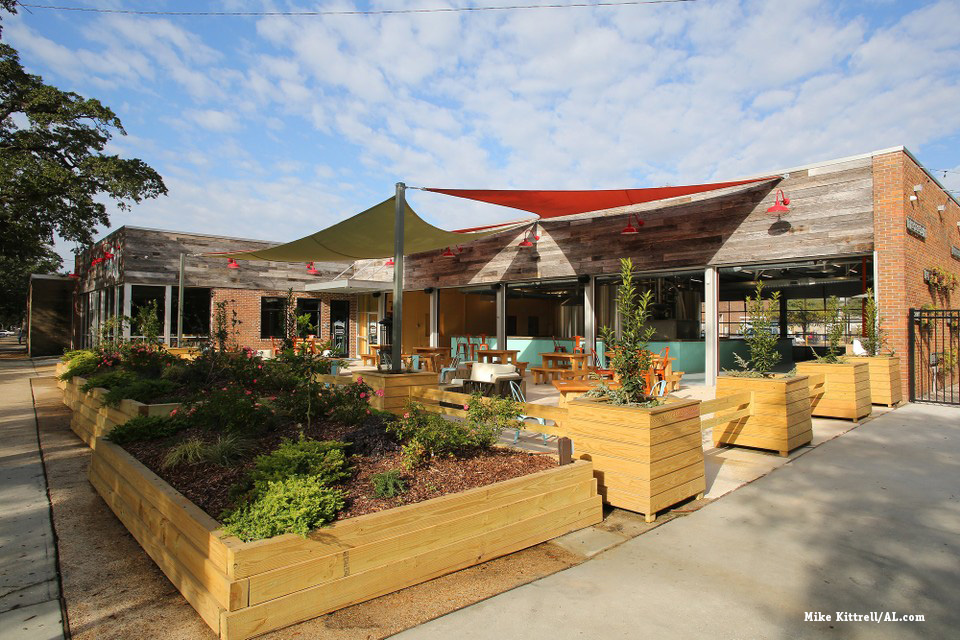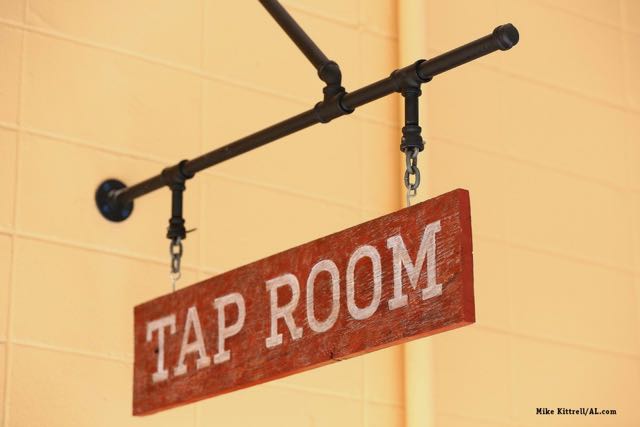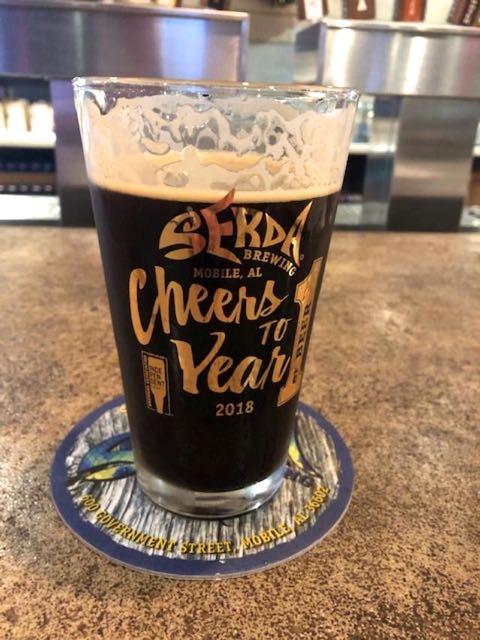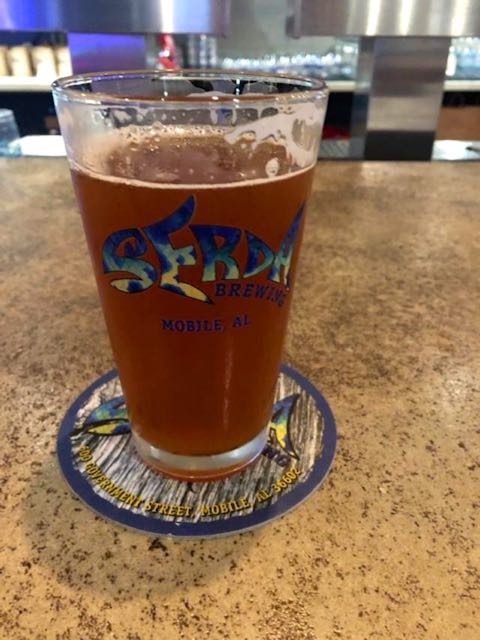“It Drink Pretty Good, Don’t It?”
by Marty Nopper, Tastemaker in Residence
As all four of you know, the home office for my company is located in picturesque downtown Mobile, Alabama. With its southern charm and New Orleans feel, it is a nice destination to go to when the boss calls. Fortunately for me, there’s always some free time stashed away and a short UBER ride can get you to just about anywhere downtown in under 5 minutes. Recently, I had the need to travel there for some company business and heard about a brewery that had opened about a year ago. Although I had previously been there, I wasn’t able to spend the requisite time needed to get a really good feel for the place and, therefore, wasn’t able to write something down. I wanted to change that this time around.
Popping in on a Monday night, I was greeted by several colleagues who were there for an exercise class. The brewery just started these classes as a way to gather more bodies in the door and maybe to enjoy a pint after Pilates. It worked as my said colleagues were still at the same spot 2 hours later… Serda Brewing is a craft beer microbrewery in downtown Mobile, Alabama, which serves the Greater Mobile and regional Gulf Coast markets. Located at 600 Government Street, the 1 acre location is a production and packaging facility as well as a pub-style hospitality venue for tours and retail bar sales of the brewery’s products. The beers offered will reflect traditional German beer styles as evolved by modern American craft brewer boldness and innovation. Serda Brewing is the first brewery in Mobile since prohibition.


According to Serda, the core brand beers are traditional German styles that have had an American craft beer face lift: richer in flavor, bolder in strength, more complex in character, a reflection of the past with modern craft brewing innovation. There is a notable void in the industry craft beer menu as most new breweries have focused on West Coast style micro-brews and a smattering of English style ales. Serda Brewing will bring about more choices of what consumers are looking for in a market crowded with a limited style selection.
Once I had finally gathered myself at the bar, I took a look at the brew board and ordered my stand by IPA. In this case, it was a Mobile Bay IPA. As Serda would see it, Mobile Bay is “brewed with several new German hop varietals and traditional alt-bier yeast using American craft brewing techniques to drop a hop bomb of unique citrus aromas balanced with the smooth malt base of German barley”. I thought it was pretty hoppy (55 IBU) and had just a scent of the citrus aspect they mention. Did notice a very cloudy body, subtle maltiness and the somewhat smooth aftertaste. Traditional microbrewery IPA that’s not West Coast. With an ABV of 7.5%, it was the perfect parietal punch. A few minutes later, it was off to the races. If they were in Munich. Schwarzbier Black Lager was my next selection as I wanted to see how different these selections could be. Man, were they…Actually appearing as a dark brown, this 5.3% ABV love liquid is right along the same lines as Guinness. Everyone freaks ‘cause it looks soooo heavy but the reaction after the first sip tells the story. It is very light and clean, lower ABV than you would think, and possesses a thin, lacey head upon the pour. Can really enjoy this if something other than a Budweiser is what you are Jonesing for. Time for the last sudsy selection of the night. Royal Roast Espresso Porter looks tasty and is starting to show up on a lot more beer boards as a result of the change in seasons. Made from coffee served at their coffee bars, Royal Roast had an unbelievably great taste! Did I mention that it was gratis due to the fact that the keep may have poured the wrong beer for another table? No worries. Marty likey. I’m sure he told me his handle but I was too busy sharing a stick of spaghetti with my carbonated colleague. I’m sure I thanked him repeatedly. Heavy on the coffee taste and aroma, I found it exactly how I would think this would be as I have had others that failed the test after being labeled a ‘coffee beer’. Contemplating another, I turned my attention to a less potent lobe lobotomizer. Tidewater Vienna Lager was appropriately picked as it is the nickname for the Virginia wetlands region I live in. A smooth malty amber mainstay with clean moderate hop bitterness in balance with toasty sweetness. Floral and spicy in both malt and hop aroma, but easy drinking and satisfyingly complex. What? Pouring a reddish amber with a tight creamy white head, I did notice (barely) some floral and spicy aromas from both the toasted malts and noble hops. Once settled in the mug, the carbonation subsides to a smooth and slightly sweet quaff with a hint of caramel and a kiss of herbal hops. A good libation for those who can’t seem to understand the benefits of IPA’s and need to drive home. That’s what UBER is for.


All of this Mobile happiness almost never took hold. Alabama had been famous for keeping a brew buddy down by having archaic laws still on it’s books when it came to breweries and the product’s they made and served. The Brewery Modernization Act (SB192, ‘The Jobs Bill’), signed into law by then Governor Robert Bentley in 2011, changed the landscape for breweries. At that time, there were 0 breweries operating in the state. Today, there are 30+. What, exactly, does it offer? AL.com states, “First, the 80-seat restaurant requirement is gone; a brewpub would need to sell food for folks to eat on the premises, but it wouldn’t necessarily have to come from a kitchen (think chips and pretzels). This would allow brewers and pub owners to put more focus on making quality beer, and to spend less time worrying about how they can staff a kitchen to handle an influx of 80 customers.
Second, it would allow brewpubs to package and sell their beer to distributors for sale at locations other than the pubs. If you were to walk in, try the brews and love them, you’d no longer be restricted to drinking them right there. You wouldn’t be able to purchase directly from the brewpub for off-premise consumption, but you would be able to go to the store and buy some, assuming the brewery has decided to package its beer in kegs for sale off-premise.
Brewpubs would still have to be located in an historic building, in a registered historic district or — and here’s the new part — in an area that a city council deems “economically distressed.”
Finally, in the BMA there’s still a specification that a brewpub can only exist in a county that had a brewery prior to 1918. But, from what I understand, the burden of proof lies not with the brewpub owner but with anyone that can prove a brewery did NOT exist in the county before 1918. Either way, this doesn’t apply to Mobile, which had a fairly rich brewing tradition prior to prohibition.”
All of this success over the last 7 years didn’t come without some opposition, though. There were many smart Alabamians who opposed any effort to legalize the sale of suds on the premises of a porter producer. Representative Alvin Holmes was one of them. A 20-year veteran of the legislative body, Alvin Holmes is a former Democratic member of the Alabama House of Representatives, representing District 78. Holmes was defeated in the primary runoff on July 17, 2018, but was a staunch opponent of anything craft. If you’re looking for a laugh, please click on the link below to hear his argument against the breweries.
http://www.youtube.com/watch?v=MZoTJzh13n8
Enough said. Wow.
https://serdabrewing.com/
Facts
Prior to the passing of SB192 in 2011, there were rules in place to hinder the sale of brew by breweries (even hurts me to say it!). Here are some facts pulled by Wiki…remember, some rules were changed by the Bill.
-The Code of Alabama defines beer as being fermented malt liquor containing between 0.5% alcohol by volume (ABV) and 13.9% ABV. Before 2009, beer in Alabama was limited to 6% ABV or less. The only other states with similarly low limits were Mississippi and West Virginia.
-Beer, except draft or keg beer, sold by retailers must be sold or dispensed in bottles, cans or other containers not to exceed 25.4 ounces (750 ml). Prior to the passage of legislation in 2012, container size was limited to 16 ounces.
-Brewpubs in Alabama must be located in an historic building or site, in a wet county or wet municipality, in which county beer was brewed for public consumption prior to the ratification of the Eighteenth Amendment to the U.S. Constitution in 1919.
-By law, beer brewed by a brewpub cannot be possessed, sold or dispensed except on the premises where it is brewed. Brewpub beer also cannot be packaged or contained in other than barrels from which the beer is to be dispensed.
-The brewpub must contain and operate a restaurant with a seating capacity of not less than 80.
-On May 9, 2013 Alabama governor Bentley signed HB9 into law, allowing Alabama residents to legally homebrew beer. Alabama became the 49th state to legalize homebrewing. Mississippi's legislature passed a law to legalize homebrewing, however it took effect months after Alabama's law did. Alabama residents are limited to 15 gallons of production per quarter and no more than 15 gallons on premises at one time. However, residents of dry counties, dry municipalities, minors and convicted felons are still prohibited from producing homebrewed beer.
If ever in the Mobile area, stop by Serda’s for a pint o pleasure. See the sights and if you happen to be down there in late January or early February, enjoy the Mardi Gras. It is the actual home of the celebration. Word. Drink responsibly!


